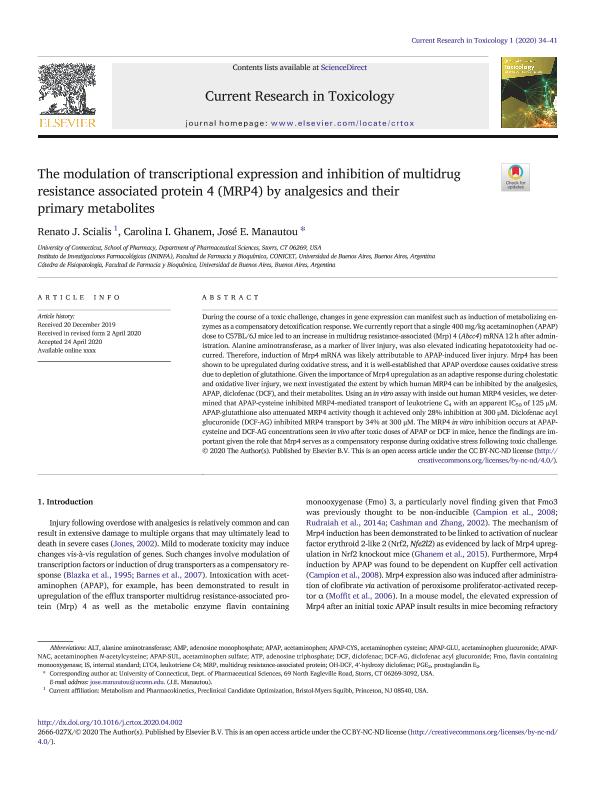Mostrar el registro sencillo del ítem
dc.contributor.author
Scialis, Renato J.
dc.contributor.author
Ghanem, Carolina Inés

dc.contributor.author
Manautou, José E.
dc.date.available
2021-08-27T14:59:20Z
dc.date.issued
2020-06
dc.identifier.citation
Scialis, Renato J.; Ghanem, Carolina Inés; Manautou, José E.; The modulation of transcriptional expression and inhibition of multidrug resistance associated protein 4 (MRP4) by analgesics and their primary metabolites; Elsevier; Current Research in Toxicology; 1; 6-2020; 34-41
dc.identifier.issn
2666-027X
dc.identifier.uri
http://hdl.handle.net/11336/139090
dc.description.abstract
During the course of a toxic challenge, changes in gene expression can manifest such as induction of metabolizing enzymes as a compensatory detoxification response. We currently report that a single 400 mg/kg acetaminophen (APAP)dose to C57BL/6J mice led to an increase in multidrug resistance-associated (Mrp) 4 (Abcc4) mRNA 12 h after administration. Alanine aminotransferase, as a marker of liver injury, was also elevated indicating hepatotoxicity had occurred. Therefore, induction of Mrp4 mRNA was likely attributable to APAP-induced liver injury. Mrp4 has been shown to be upregulated during oxidative stress, and it is well-established that APAP overdose causes oxidative stress due to depletion of glutathione. Given the importance of Mrp4 upregulation as an adaptive response during cholestatic and oxidative liver injury, we next investigated the extent by which human MRP4 can be inhibited by the analgesics, APAP, diclofenac (DCF), and their metabolites. Using an in vitro assay with inside out human MRP4 vesicles, we determined that APAP-cysteine inhibited MRP4 mediated transport of leukotriene C4 with an apparent IC50 of 125 μM. APAP-glutathione also attenuated MRP4 activity though it achieved only 28% inhibition at 300 μM. Diclofenac acyl glucuronide (DCF-AG) inhibited MRP4 transport by 34% at 300 μM. The MRP4 in vitro inhibition occurs at APAPcysteine and DCF-AG concentrations seen in vivo after toxic doses of APAP or DCF in mice, hence the findings are important given the role that Mrp4 serves as a compensatory response during oxidative stress following toxic challenge.
dc.format
application/pdf
dc.language.iso
eng
dc.publisher
Elsevier

dc.rights
info:eu-repo/semantics/openAccess
dc.rights.uri
https://creativecommons.org/licenses/by-nc-nd/2.5/ar/
dc.subject
ANALGESIC
dc.subject
ACETAMINOPHEN
dc.subject
MRP4
dc.subject.classification
Otras Ciencias Médicas

dc.subject.classification
Otras Ciencias Médicas

dc.subject.classification
CIENCIAS MÉDICAS Y DE LA SALUD

dc.title
The modulation of transcriptional expression and inhibition of multidrug resistance associated protein 4 (MRP4) by analgesics and their primary metabolites
dc.type
info:eu-repo/semantics/article
dc.type
info:ar-repo/semantics/artículo
dc.type
info:eu-repo/semantics/publishedVersion
dc.date.updated
2021-08-25T19:44:01Z
dc.journal.volume
1
dc.journal.pagination
34-41
dc.journal.pais
Estados Unidos

dc.description.fil
Fil: Scialis, Renato J.. University of Connecticut; Estados Unidos
dc.description.fil
Fil: Ghanem, Carolina Inés. Consejo Nacional de Investigaciones Científicas y Técnicas. Oficina de Coordinación Administrativa Houssay. Instituto de Investigaciones Farmacológicas. Universidad de Buenos Aires. Facultad de Farmacia y Bioquímica. Instituto de Investigaciones Farmacológicas; Argentina
dc.description.fil
Fil: Manautou, José E.. University of Connecticut; Estados Unidos
dc.journal.title
Current Research in Toxicology
dc.relation.alternativeid
info:eu-repo/semantics/altIdentifier/url/https://linkinghub.elsevier.com/retrieve/pii/S2666027X20300050
dc.relation.alternativeid
info:eu-repo/semantics/altIdentifier/doi/http://dx.doi.org/10.1016/j.crtox.2020.04.002
Archivos asociados
